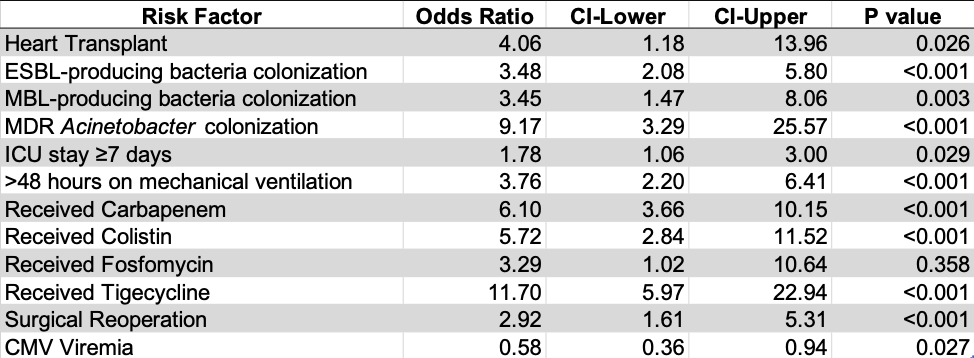Risk Factors for Early Multidrug-Resistant Infections in Solid Organ Transplant Recipients: How Impactful Are Donor-Derived Infections?
1School of Medicine, University of Pittsburgh, Pittsburgh, PA, 2Division of Infectious Diseases, University of Pittsburgh, Pittsburgh, PA, 3Istituto Mediterraneo per i Trapianti e Terapie ad Alta Specializzazione (IRCCS-ISMETT), Palermo, Italy
Meeting: 2020 American Transplant Congress
Abstract number: LB-022
Keywords: Donation, Length of stay, Safety, Screening
Session Information
Session Name: Poster Session B: Late Breaking
Session Type: Poster Session
Date: Saturday, May 30, 2020
Session Time: 3:15pm-4:00pm
 Presentation Time: 3:30pm-4:00pm
Presentation Time: 3:30pm-4:00pm
Location: Virtual
*Purpose: The purpose of this study is to evaluate risk factors for early post-transplant infections by multi-drug resistant gram-negative bacilli (MDRGNB).
*Methods: We retrospectively assessed the risk factors for MDRGNB infection in solid organ transplant (SOT) recipients at ISMETT, where MDRGNB are endemic. Within an active surveillance system for potential donor-derived infections (DDIs), we aimed to see if DDI is a risk for early (within 3 months post-transplant) MDRGNB infections in recipients. A univariate analysis was performed for 28 variables.
*Results: Of 455 SOT, 25 had a high risk of DDI (donor with MDRGNB bloodstream or transplanted organ infection). 84 of 455 organ recipients developed 103 early MDRGNB infections, and 2 were considered DDIs. Common disease-causing pathogens were carbapenem-resistant Klebsiella pneumoniae (52%), extended-spectrum beta-lactamase-producing bacteria (37%), and carbapenam-resistant Acinetobacter baumanii (8%). High risk of DDI, cytomegalovirus mismatch/disease/viremia, rejection, and urinary/biliary/tracheal stenosis were not associated with early recipient infection using chi-squared tests (Image 1). Of the infected recipients (n=84), 77.4% of them had a previous rectal colonization by the same pathogen responsible for the infection (CI:68.4-86.3%; p<0.001).
*Conclusions: Being at high risk for DDI is not a major risk factor for early post-transplant MDRGNB infection within an active surveillance system, indicating that infected organs may be used in SOT with an active surveillance system and early preemptive targeted therapy in the high risk recipients. Many other factors, mainly related to hospital stay, increase the risk for MDRGNB infections. Recipients who developed MDRGNB infections were more likely to have been previously colonized by the same infecting pathogen, demonstrating the importance of infection control measures for infection prevention. This is a preparatory study for the purpose of creating a score that could help identify patients at risk of developing an MDRGNB infection in the early post-transplant period.
To cite this abstract in AMA style:
Miller TT, Kwak EJ, Floridia G, Tuzzolino F, Luca A, Mularoni A. Risk Factors for Early Multidrug-Resistant Infections in Solid Organ Transplant Recipients: How Impactful Are Donor-Derived Infections? [abstract]. Am J Transplant. 2020; 20 (suppl 3). https://atcmeetingabstracts.com/abstract/risk-factors-for-early-multidrug-resistant-infections-in-solid-organ-transplant-recipients-how-impactful-are-donor-derived-infections/. Accessed February 27, 2026.« Back to 2020 American Transplant Congress

